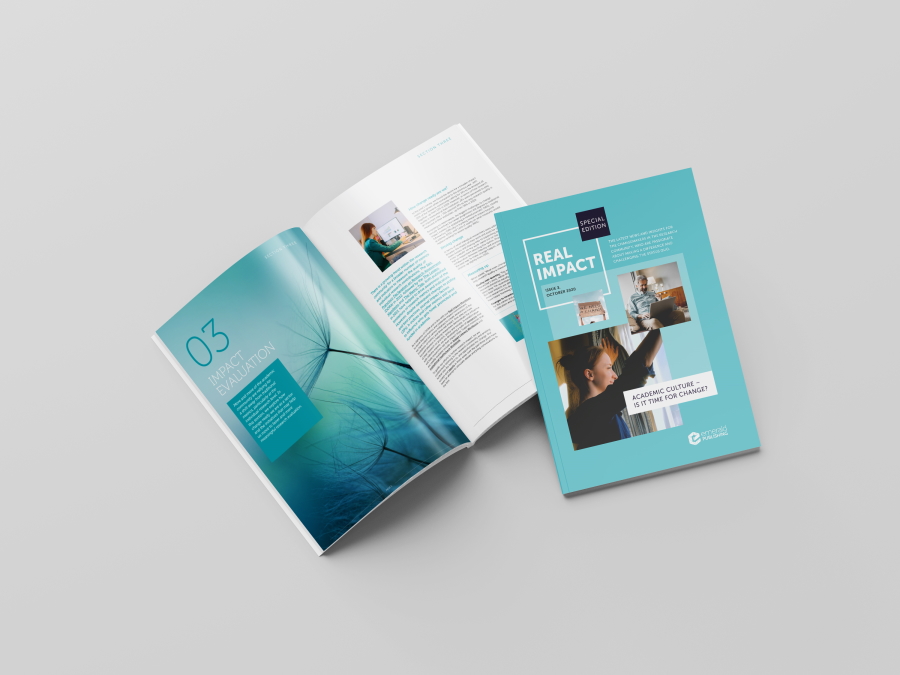In August 2020, we commissioned a global survey to gather views on change within the academic sector. The survey was sent to a random selection of 172,033 academics, librarians and students within Emerald’s literati community. A total of 1,274 literati from 188 countries responded.
The survey report covers attitudes to research impact evaluation, cultural challenges within academia, openness and transparency, and the role publishers can play in furthering change within the research ecosystem.
Use the 'On this page' and 'In the report' menus to quickly see and jump to content you're interested in, or scroll down to see what's here.
- Academic culture
- Impact evaluation
- Openness & transparency in academic research
- The future role of publishers

Academic culture
On this page, we focus on the role of the publisher as it relates to topics such as open access and the impact agenda, in addition to innovations in publishing, and the rise of research support services.
Key themes
Since the launch of the San Francisco Declaration on Research Assessment (DORA) in 2012, many publishers along with research institutions, funders and other stakeholders have committed to the development and use of fair and balanced research assessments. Publishers are strongly positioned to be effective advocates and actors of change, ensuring that individual research is judged on its own merits and not the journal in which the work appears.
As a signatory of DORA and in line with our Real Impact Manifesto, Emerald is working with the academic community and key agencies to improve the culture around research evaluation, overcome barriers to impact and drive impact literacy.
To give researchers different ways to tell the story of their work, Emerald is commissioning a broader range of research outputs such as Emerald Open Research (EOR). Through six gateways that are aligned to the United Nations Sustainable Development Goals, research published through EOR is subject to open peer review and is freely available to all to read, download and reuse.
Beyond publishing, Emerald is supporting areas such as research promotion and novel research outputs, as well as providing Early Career Researchers (ECRs) with advice and resources that will help them publish and win funding bids.
Promoting change
There is a broader range of publishing and support services now on offer, but where does the research community want publishers to focus attention? To answer this question, we asked researchers across the globe for their views on how publishers should support change around research assessment and output.
Our survey found that the majority (61%) want publishers to lead with different options to publish and nearly half of respondents (46%) are looking to the industry to champion alternative methods of impact. However, Asia and the Middle East and North Africa were less likely to look to publishers to initiate change.
In addition to creating new ways to publish work, 45% of researchers want publishers to help with promotion. Another area of focus is the desire to see more exploratory research published. In terms of driving change within academic culture, while the majority felt that publishers could play a role, 8% disagreed, rising to 12% for researchers who were 16–20 years postgraduate.
What, in your opinion, could publishers do to help improve academic culture?



|
|
Net agree (scored 4–5) |
|---|---|
| Offering different options to publish | 61% |
| Champion alternative methods of impact | 46% |
| Provide more support for post-publication promotion | 45% |
| Publish more exploratory research | 43% |
| I don’t think publishers can play a role in improving academic culture | 8% |
Research challenges
Digging into the biggest problems with the way research is done today, the research community believe that too much funding is directed towards established researchers, with just over half of the respondents (51%) agreeing with this. However, researchers in the UK (61%), Australasia (64%), Sub Saharan Africa (63%) and India (60%) felt more firmly. Half also agreed that there was ‘Too much focus on research by stealth (trying to fit the research into funding opportunities)’, here the UK (59%), and Sub Saharan Africa (61%) significantly over indexed in their views.
The academic community appears to be dissatisfied with the constraints of the current research approach, for example, 42% of researchers agreed that not enough time/space was given to failure. This sentiment was mirrored in the desire for researchers to see more exploratory research published.
What, in your opinion, are the problems with the way research is done today?


|
|
Net agree (scored 4–5) |
|---|---|
| Funding only given to established researchers | 51% |
| Too much focus on research by stealth (trying to fit the research into funding opportunities) | 50% |
| The academic culture doesn’t encourage opportunities to challenge ideas | 45% |
| Not enough time/space given to failure | 42% |
| Incentives to publish don’t focus on the quality of research | 37% |
| Poor opportunities for collaboration with practice | 37% |
| Poor opportunities for collaboration with different disciplines | 35% |
And finally...
If there is anything else you would like to comment about, please use the box below.
Top four words/phrases:
- Ideas
- People
- Universities
- Quality

The Emerald view
In 2020, amid a global pandemic, scholarly publishing is being challenged and transformed like never before. As the world seeks answers to the health and economic challenges of the crisis, Sally Wilson, Head of Publishing at Emerald Group, shares how publishers can support the researcher’s journey to real-world impact by reaching the beneficiaries of the research, as well as giving a voice to the underrepresented.
![]()
The results of this latest survey support a growing view that academia’s culture and incentive structures need reimagining. Key areas for change include the practices and policies towards equality, diversity and inclusion (EDI), particularly around hiring and promoting faculty and non-academic staff at the senior level. The same is true for incentive structures and ranking systems, which are designed to favour sameness, commonality, mould and ideal.
The pandemic has accelerated the desire for research that can make a difference and solve big problems. In academia, we are seeing an increased move towards the real impact agenda, although at different paces in different regions, as well as growth in the number of interdisciplinary research centres within higher education institutions. At the same time, the UN Sustainable Development Goals (SDGs) are becoming more and more part of the recognised language within researcher, policymaker and funder communities.
Emerald’s commitment to real impact
Publishers have a vital role to play in furthering research that can make a real-world impact and this focus has become fundamental to our work and values at Emerald. In 2019, we signed up to DORA (Declaration on Research Assessment), leading us to supplement traditional impact factors and work towards a variety of complementary metrics such as Altmetric – to measure attention and reach.
Part of Emerald’s real impact agenda is supporting and giving a voice to those underrepresented. To this end, we have signed a Royal Society of Chemistry-led industry initiative that commits us to setting a new standard for a more inclusive and diverse culture within scholarly publishing. Work is now underway to support greater diversity through our recruitment practices, editorial boards and authorship.
Diverse publishing options
Emerald’s teaching cases are a useful illustration of our efforts to demonstrate impact and increase representation. Traditionally, cases have not reflected diverse or global voices, but we are at the forefront of trying to create that diversity within our offer. An example of this is our new case competition with the Association of African Business Schools (AABS) for 2021, which has a prize for the most innovative case teaching method or The Case for Women competition in partnership with Forté with its focus on female protagonists.
A further way we are enabling change is through Emerald Open Research – a platform that provides a fast route to publication and fully supports interdisciplinary research, with a focus on the SDGs. Alongside this platform, we are exploring new ways to transform our content that may include providing novel content types such as podcasts, animations, policy briefings or lay summaries. The overall aim is to engage a wider audience beyond academia, including those who will ultimately benefit from the research.
Career support
We know that the needs of researchers change over time, so we are continually looking at how we can provide the most appropriate services, products and initiatives to serve them throughout their careers. To help early career researchers (ECRs), for instance, we offer sponsorship of awards and invite them on to our journal editorial boards, while through our Impact Services we equip them with the skills and resources needed to help them win funding bids.
Beyond this support, we offer practical advice for those looking to get published with activities such as workshops and webinars. In the current climate, one of the most noticeable benefits of reaching out online is that there are often fewer barriers to entry, enabling us to support a richer, more diverse audience, who are at different stages in their career.
Innovate to impact
Academic publishing and the communities we serve are changing, and we must continue to innovate to provide a flexible and diverse publishing and services offer that meets the needs of the research community both now and in the future. Publishers are uniquely placed to support researchers in other ways too, such as helping them present their research in new and inventive ways.
In summary, publishers have a duty to drive, support and encourage changes that must take place within scholarly publishing and academia to make it a more diverse and inclusive research culture. This is a responsibility that we at Emerald are embracing and is part of our manifesto to be a home for research that achieves attention, reach and real-world impact.


